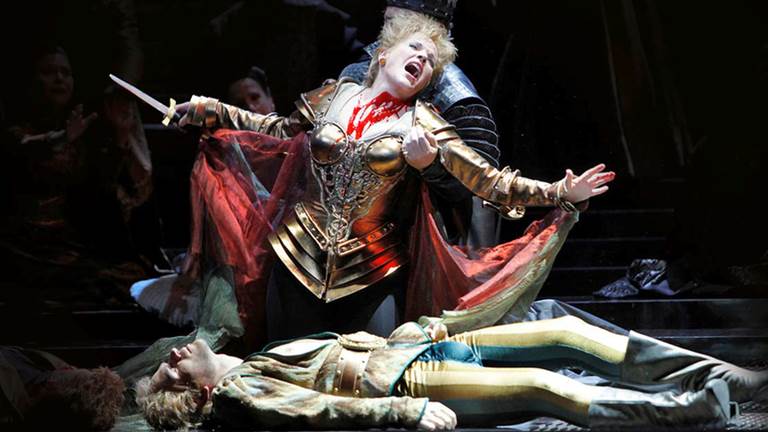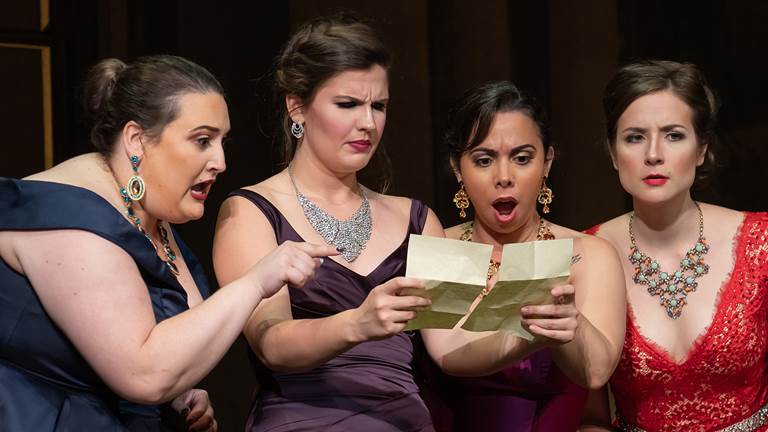Some thoughts for discussion topics after the final bows.
Evaluate
The rock band Cake says of opera singers that they “sing what can’t be said.” Did the singing heighten the action? Would the opera have been just as effective if it were a play?
Critical Thinking
In what time period was the opera set? Is the plot applicable to modern times? Does the story remind students of events in the news?
Narrative Inference
What kind of story did the opera present? Did the opera have a definitive hero or heroine? Were the main characters outcasts or pillars of their community?
The Skeptics
We’ve all met them. Opera cynics: people who are skeptical about giving opera a chance. Perhaps even you, the teacher, are just a bit wary of this centuries-old art. So, need to know how to respond to skeptics while cultivating a love for opera? Here are a few typical statements that may arise in the classroom (or from within), and some thoughts on quieting these operatic anxieties:
“I just don’t like opera.”
A fun way to respond to this is by asking, “How much have you listened to?” Lots of people have a resistance to opera because they’ve heard it’s only for the super nerdy or the very uncool, but their actual experience with opera is usually very limited. If they say they don’t like it, they probably haven’t heard or seen an opera that speaks to them yet. Remind students that opera is like film––it’s an art form that comes in many different shapes and sizes. There’s no one type of opera, and not all opera is the same. While they may not like some opera, they’re bound to find at least one opera they can relate to and enjoy in some way.
“It’s unrealistic. No one sings their thoughts in real life.”
Yes, they do. It’s called intonation. People’s voices rise and fall all the time according to a given situation. The standard example is a question, which usually makes our voices rise (“Like…really?”), but also consider what people say when they arrive in a familiar place: “Helloooooo!” or “Honey, I’m HOOoooome!” There’s music in there. Operatic singing is just an intensified version of things we already hear when we speak.
“I won’t be able to understand the words.”
True, the majority of popular operas are sung in Italian, French, or German, but that doesn’t mean students won’t be able to understand the action. First of all, a little preparation goes a long way. Sometimes, just reading a plot synopsis before the curtain goes up can help students stay on track throughout the evening. For the more ambitious students in the class, several opera companies will offer editions of English translations of operatic libretti to be read ahead of time.
In addition, many opera houses are equipped with state-of-the-art subtitles or supertitles that flash English translations above the stage or project them on the seats directly in front of you. However, when in doubt, the music will always give students a clue as to what’s going on. If the heroine is dying, you can bet there will be some ominous sounds coming from the orchestra pit.
“Opera is just a bunch of romance and swooning.”
There are a lot of operas that revolve around passionate love stories, it’s true. But not all operas are about romance, just like how not every movie is a rom-com. Plenty of operas are full of action and intrigue – often right alongside the romance! Not every story is Romeo and Juliet – opera is packed with warriors, kings, soldiers, revolutionaries, and gods. Think sword fights and magic weaponry. In fact, a lot of the comic book heroes of today like Thor and the X-Men have their roots in operatic characters.
“Isn’t it all just ladies with braided hair and Viking hats singing really high?”
First of all, her name is Brünnhilde, and no, she’s not all there is to opera. Let your students know that the Viking lady they’ve seen in commercials is actually more of an opera mascot—she’s just one symbolic character. While some operas feature whacky figures from mythical lands, a lot of them just focus on everyday people caught in sticky situations. And while some of them sing pretty high, they can also sing really, really low.




